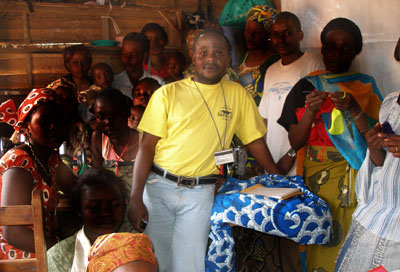
These days, when you hear about the situation in eastern Democratic Republic of Congo, you typically hear about men perpetrating acts of violence, rape, and other atrocities. Rarely do we hear about Congo’s courageous men, who defend the rights of women and children and who work day in and day out to bring peace to their country.
In the short time that I have been in eastern Congo, I have met many such courageous Congolese men, some who work with humanitarian aid organizations to ensure that the rights of the thousands of internally displaced Congolese are protected, and some who denounce sexual violence and the traditional subjugation of women. I have also met men who work in rural communities to resolve conflict at the local level and to ensure that rape survivors are not shunned by their husbands or communities. Make no mistake, there are countless Congolese men who possess the strength of character and conviction to join forces with women and demand peace in their country.
One individual stands out in my mind, so I want to highlight the story of Amani Matabaro Tom.
The name “Amani” means peace in Swahili, which comes as no surprise. He is one of the most passionate and generous people I’ve met. A few years ago, Amani was working as a fixer and translator for an American journalist in Congo when he had the idea to start the Kivu Sewing Workshop. No stranger to the struggles faced by orphans?his parents were killed when he was a young child ?Amani understands firsthand the obstacles faced by marginalized people in society. Amani decided to create a program that would give some sliver of hope to people who often slip through the cracks in eastern Congo.
When he got started, Amani rented a small shack in the middle of town and invested in a few sewing machines. In a small, cramped space, Amani, his wife, and a few other trainers teach women how to sew and provide a support network for people who are on the fringe of Congolese society. Since founding the workshop, Amani has expanded his organization, Actions for the Welfare of Women and Children in Kivu, to also provide small microcredit loans to women. The organization also identifies children who have dropped out of school for lack of funds or familial support, and helps them re-enroll in school. Despite the generosity of a few supporters, Amani funds these programs mostly out of his own pocket.
When he showed us around the workshop, he introduced us to a widow whose husband was murdered, leaving her to care for their seven children alone. Amani brought the woman into the workshop and gave her a micro-loan of $200. With this money, she is able to sell flour, beans, and palm oil. The money she makes is not sufficient, but without it she would have nothing. Amani also introduced us to a teenage girl who was brutally gang raped when she was only 13-years-old and has a baby boy as a result of the rape. Her parents were killed, leaving this new mother – who is still a child herself – without any support network. Her child reminded her of the pain and suffering she had endured. Amani has since brought her to the workshop, and thanks to the support of the workshop and the generosity of Amani, she is beginning to come alive again and care for her child. She wants to be a teacher one day and hopes that her child will have an education and a better future.
Though he has seen ethnic rivalries tear apart his country and the broader region, Amani fiercely believes that nationalities and ethnicities should be able to live peacefully, and for that he has paid a steep price. When two Rwandan women married to Congolese men were brought to his attention because they needed help, he invited them to participate in the workshop. His generosity to these Rwandan women was not viewed favorably by many Congolese, who blame Rwanda for the violence that continues to plague eastern Congo. One evening a few weeks ago, Amani, his wife, his six children, and the orphan he has taken in were sitting in their living room when they heard their neighbors shouting that their house was on fire. They all escaped the house just before it burned to the ground, along with all their possessions and most of Amani’s savings. The subsequent investigation indicated that his house had been firebombed, likely in retaliation for the generosity he showed to the Rwandan women.
Despite the challenges he faces, Amani continues to support his organization and the workshop, and he continues to dream of expanding his programs so that he can better support those who are most marginalized in society. He has already helped so many, with so little himself.
We rarely hear about men like Amani in traditional media coverage of Congo. Pulitzer Prize-winning writer (and now White House official) Samantha Power calls them “upstanders,” people who show leadership and courage in the face of unimaginable horror. There are countless upstanders in Congo – women and men – and they need more upstanders in the United States and around the world who will amplify their local efforts to end this devastating conflict once and for all.
Candice Knezevic, the RAISE Hope for Congo campaign manager, is currently traveling in eastern Democratic Republic of the Congo.

